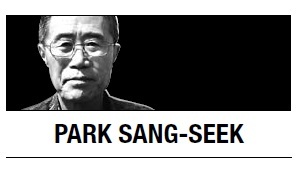[Park Sang-seek] Brexit’s implications for the world order
By Jo He-rimPublished : July 24, 2016 - 16:01
 Brexit has alarmed practically the whole world, and world political leaders, pundits, columnists and mass media have expressed their views on its impact on the future of the U.K., the EU and the world. In my view, the root causes of Brexit and its implications for the future international political order are a more important question to explore.
Brexit has alarmed practically the whole world, and world political leaders, pundits, columnists and mass media have expressed their views on its impact on the future of the U.K., the EU and the world. In my view, the root causes of Brexit and its implications for the future international political order are a more important question to explore.
At present the main actors in international relations are nation-states. A nation is a primary group consisting of a people sharing a common history, culture and language. But in actual reality most of the states that have become independent after WWII are tribal or theocratic states in which ethic (or racial) or religious identity is the strongest unifying force -- stronger than any other type of identity.
In the late 1960s globalization began to accelerate very rapidly. International finance capitalism and international liberalism are twin engines for globalization. Both share the same goal: the replacement of the nation-state system with a global state system. International financial capitalists want to turn the whole world into a global free market, while international liberalists want to make the whole world democratic and turn human rights and fundamental freedoms into universal values.
Since their goals are mutually reinforcing, they have been actively cooperating for globalization. But these forces of globalization are now faced with opposition from primary groups and low and middle classes in the West and the non-West. In the West both groups suffer from rapid globalization. The middle and working classes become poorer while the upper class becomes richer, resulting in sharp income polarization.
As a result, middle and working class people become more ethnically conscious and xenophobic because immigrants erode national identity and take their jobs. They and radicals join forces to form antiestablishment movements. Those who support globalization hold that the more globalized countries become, the less nationalistic they become. Ironically, globalized Western countries are becoming more ethnocentric (or nationalistic) within their own countries and xenophobic in relations with non-Western countries.
The emergence of neo-isolationism in America is symptomatic of this movement. A similar trend is taking place in the non-West. As globalization accelerates, non-Western states become more nationalistic externally, mainly because the widening and intensifying influence of international liberalism and international financial capitalism on the one hand and the wealth disparity between the West and the non-West on the other increase the influence of the West on the non-West, while internally the increasing wealth disparity and status discrepancy among primary groups intensify the conflicts among them.
From this perspective, the division in the EU is ironic, mainly because the EU is regarded as the symbol of triumph of globalization and democracy and the best hope and pride of international capitalists and liberalists. The ultimate goal of the EU is to create a single political entity in Western Europe.
But the 58-year history of the EU reveals that member states have no intention of merging into one single state; they are rather interested in a security and economic community. Perhaps, the true motive of the EU is to become the biggest economic community to compete with super-states such the U.S., Russia, Japan and China.
Prominent thinkers and scholars believe that the nation-state system will eventually evolve into a global political system. This is a desirable development for world peace and common prosperity of humanity. However, there are two obstacles. One is that globalization creates unequal distribution of wealth within and between states mainly because international finance capitalism makes it inevitable.
Another is that international liberalism opposes any kind of primary group identities and advocates democratic and Western values such as humanitarian intervention, separation of secular and spiritual authority and absolute freedom of speech, while advocating social and ideological identity formation.
The stronger the forces of globalization become, the stronger the resistance of primary groups becomes in both the West and the non-West. Whether they are age old or newly independent, nation-states strongly uphold the principles of self-determination and national sovereignty. All nations join regional, inter-regional and international organizations mainly to promote their own national interests, not to promote a global community.
Nevertheless, international financial capitalism and liberalism will continue to push the world toward a single political entity. In this sense, Brexit is an alarm bell and a bitter lesson for globalists. It is also proof that the nation-state system is alive and well and will continue to remain the main structure of the global political order for a long period of time.
By Park Sang-seek
Park Sang-seek is a former rector of the Graduate Institute of Peace Studies, Kyung Hee University, and the author of “Globalized Korea and Localized Globe.” He can be reached at parksangseek@hotmail.com. -- Ed.




![[Herald Interview] 'Amid aging population, Korea to invite more young professionals from overseas'](http://res.heraldm.com/phpwas/restmb_idxmake.php?idx=644&simg=/content/image/2024/04/24/20240424050844_0.jpg&u=20240424200058)












![[KH Explains] Korean shipbuilding stocks rally: Real growth or bubble?](http://res.heraldm.com/phpwas/restmb_idxmake.php?idx=652&simg=/content/image/2024/04/25/20240425050656_0.jpg&u=)

